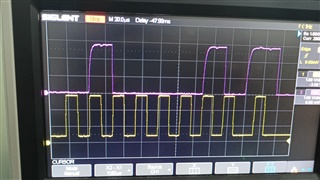Hello !
I would like to know if the nrf52840 is affected by the errata https://infocenter.nordicsemi.com/topic/errata_nRF52832_Rev2/ERR/nRF52832/Rev2/latest/anomaly_832_149.html#anomaly_832_149 or something similar ?
(I did not find it in the 52840 errata)
I am struggling to communicate with a 100KHz i2c device which require clock stretching to work. The communication often hang forever.
It sometimes work, the difference seems to be the lenght of the first clock after a stretch.
A non working screenshot :
A working screenshot:
If this is the same issue as the 832 errata, is there a known workarround ?
Thank you for your help.



